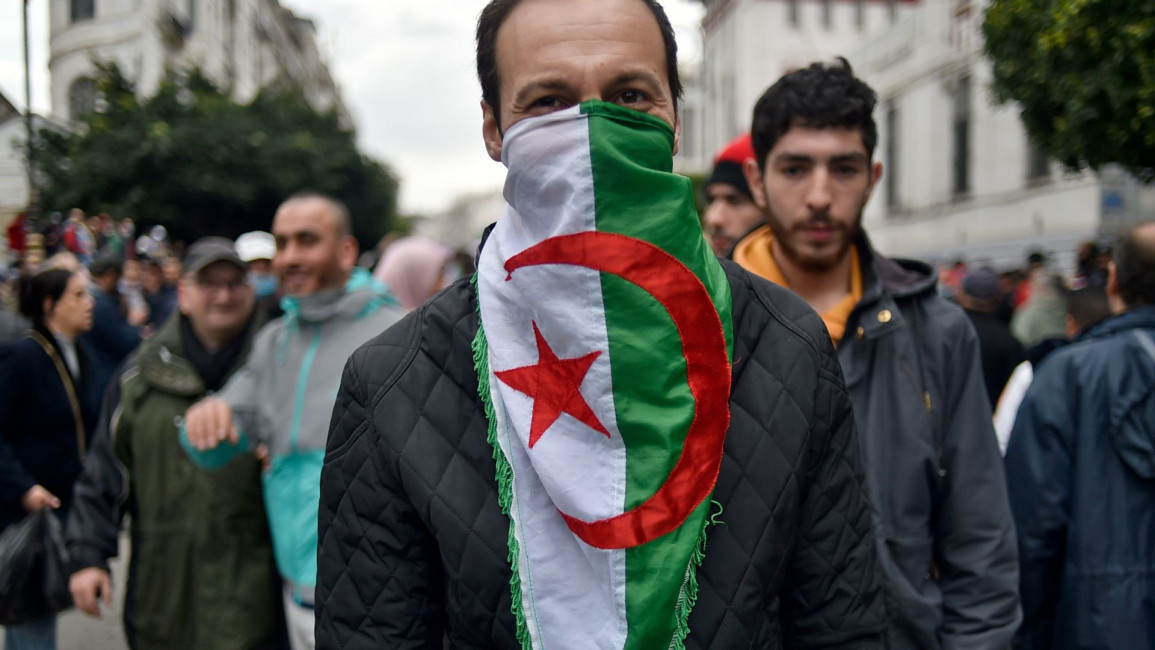
Algeria's Hirak is back, and it has a secret weapon
Faced with increased cost of living, growing unemployment, and food shortages, Algerians have returned to the streets in the thousands to demand social justice and the fall of the regime.
The president enjoyed a brief window of relief when the Covid-19 pandemic forced the Hirak movement's weekly protests, which had been taking place since February 2019, to grind to a halt. Tebboune took full advantage of the situation, introducing immediate lockdown measures, including a national curfew and the closure of national borders. After more than a year of demonstrations during which millions marched across towns and cities in opposition to the military regime, the streets emptied from one day to the next.
Tebboune assumed that he had finally broken the back of the movement and scrambled to reconcile his power. Taking advantage of the momentary reprieve, he arrested demonstrators and journalists. He also railroaded constitutional changes, and looked to the 12 June legislative elections as a mechanism for restoring his legitimacy in the face of sustained popular anger.
But the Hirak protests not only recommenced on the second anniversary of the uprisings, but they have grown in size and reach.
In recent weeks, hundreds of firefighters demonstrated in the centre of Algiers over unfair pay and living conditions. The workers, dressed in uniform, marched to the headquarters of the General Directorate of Civil Protection, marking a change from previous mobilisations in which industrial action was limited primarily to the education sector.
 |
Once again, the regime underestimated the people and their rage |  |
The state wasted no time in exacting its revenge. The police attacked strikers with tear gas and 230 of the firefighters were also suspended for supposedly "betraying their duties and responsibilities."
This disproportionately oppressive move was likely meant to serve as a warning, aiming to silence the firefighters as well as other workers seeking to fight back. But, once again, the regime underestimated the people and their rage.
In response to the suspensions, firefighters throughout Algeria have organised rallies in several regions including Béjaïa, M’sila, Jijel, and Biskra with the demand that their colleagues be immediately reinstated. Those organising in M’sila have even threatened ministers with collective resignation.
It seems that the regime is bringing about its own fears; workers striking or walking out, through its own repressive practices. This irony resembles the situation in 2019 when workers in the strategic oil and gas industry were so outraged by the state banning them from industrial action, that they walked out and joined anti-government protests.
Twitter Post
|
This recent development is a major one for the Hirak and will be reassuring to those who feared that the movement was directionless. It highlights Algeria's growing revolutionary zeal, which the regime has been unable so far to control or repress.
We have learned from other uprisings across the region (Egypt, Tunisia, Sudan) that the greatest gains are made when organised industrial action joins with street demonstrations. In the face of the upcoming elections, which have already been widely denounced as a state-controlled sham, it is particularly significant that alternative forms of power continue to grow.
Read more: On its second anniversary, Algeria's Hirak proves it never went away
Furthermore, calls to boycott the elections have been mounting, including among opposition parties. Algeria's long-standing progressive Front of Socialist Forces joined the Workers' Party and the Rally for Culture and Democracy in boycotting the process, stating that: "The elections do not constitute a solution to the multidimensional crisis that the country is experiencing."
The political consciousness and resistance that is building around the elections is also important in light of their expected outcome. Experts name the Islamist party, Harakat al-Bina, as the "most likely" winner. To some, this may feel like history repeating itself, given the Islamic Salvation Front's electoral victory after mass uprisings back in the late 80s.
The regime may see this as an opportunity. The last time a religious party took power, a civil war ravaged the country after a military coup d’état, leading to the assassination of countless left-wing figures, journalists, and artists. This dark chapter of Algeria's history has left its people so afraid that it has taken almost two decades for them to rise once more.
It will take all of the power and strength that the people can muster to stop violence, sectarianism, and bigotry from derailing their resistance.
The Algerian people understand the political games of Tebboune and his masters in the military. They will recognise any attempts to replay the political script of the 90s. Furthermore, the Hirak understands that the political system as it stands is unable to deliver them liberation.
Algerians will boycott the nationwide elections en masse, as they did the 2020 presidential election that was "won" by Tebboune. Protesters will not fall into the trap of seeking to occupy current seats of power. They know that the system needs to change, that - as the slogan goes - they all have to go.
 |
They know that there is only one way to victory and liberation: sustaining, intensifying, and maintaining the revolt from the ground up |  |
The Algerians marching, protesting, striking, and boycotting today stand on the shoulders of those who took on the regime over two decades ago.
However, the Hirak understands the limitations of past demands and the dangers of seeking incremental reforms. They have put forward more ambitious demands than their predecessors, as they seek to dismantle the entire political system. And they have been able to sustain these demands in the face of repression, attempted co-optation, and a year-long lockdown.
They know that there is only one way to victory and liberation: sustaining, intensifying, and maintaining the revolt from the group up.
Malia Bouattia is an activist, a former president of the National Union of Students, and co-founder of the Students not Suspects/Educators not Informants Network.
Follow her on Twitter: @MaliaBouattiaHave questions or comments? Email us at: editorial-english@alaraby.co.uk
Opinions expressed here are the author's own, and do not necessarily reflect those of her employer, or of The New Arab and its editorial board or staff.



